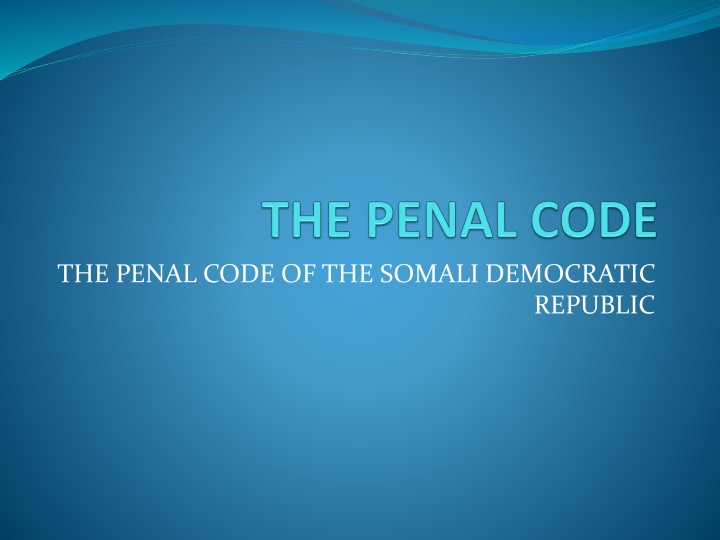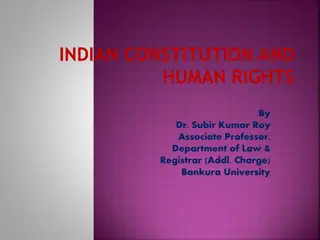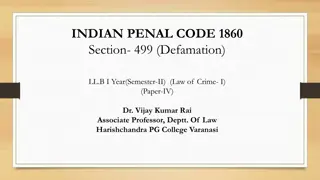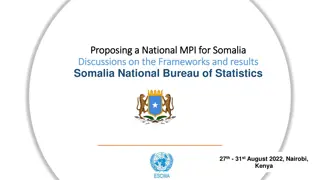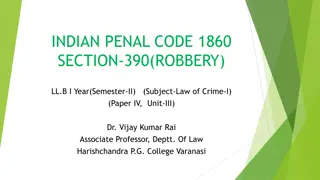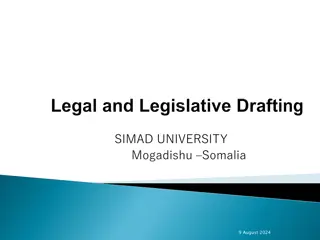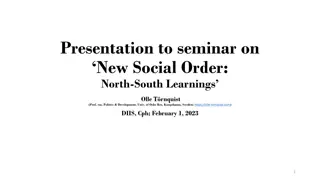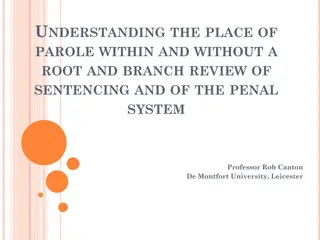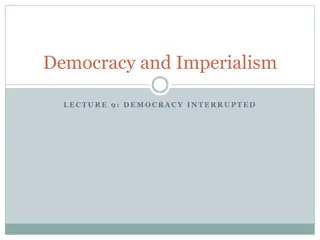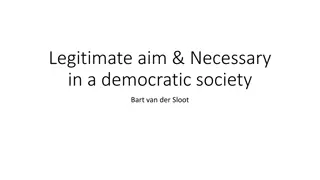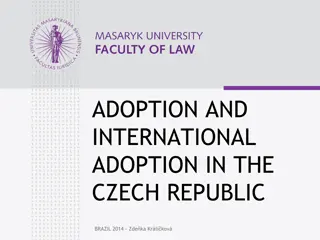The Penal Code of the Somali Democratic Republic
The Penal Code of the Somali Democratic Republic comprises three main sections focused on offenses in general, crimes, and contraventions. It specifies that individuals can only be punished for acts explicitly deemed offenses by law and outlines principles governing punishments, jurisdiction, elements of offenses, offenders, and more.
Download Presentation

Please find below an Image/Link to download the presentation.
The content on the website is provided AS IS for your information and personal use only. It may not be sold, licensed, or shared on other websites without obtaining consent from the author.If you encounter any issues during the download, it is possible that the publisher has removed the file from their server.
You are allowed to download the files provided on this website for personal or commercial use, subject to the condition that they are used lawfully. All files are the property of their respective owners.
The content on the website is provided AS IS for your information and personal use only. It may not be sold, licensed, or shared on other websites without obtaining consent from the author.
E N D
Presentation Transcript
INTRODUCTION The Somali penal Code applies to the entire republic. It is divided into three main sections, called Books. Book I deals with offenses in general; Book II deals with crimes; and Book III deals with contraventions Each book is divided into parts, which in turn are subdivided into chapters, sections and articles
BOOK I:OFFENSES IN GENERAL The word offenses is a broad general term and includes both crimes and contraventions. Crimes and contraventions are explained later, but briefly a crime is a serious offense A contravention is a less serious offense, such as conducting a public performance without a license or possessing illegal weights and measures.
BOOK ONE Book 1 deals with offenses in general, The articles contained in this book apply to both crimes and contraventions. The book involves general principles and is divided into seven parts, covering jurisdiction, elements of an offense, the offender and the injured party, punishments, application of punishments, execution of punishments, and security measures.
PART 1 GENERAL PROVISION Article 1 Offenses and punishment to be expressly provided by law No one shall be punished for an act which is not expressly made an offense by law, or with a punishment which is not prescribed therefore.
The Penal Code of the Somali Democratic Republic Explanation The first article of the penal code establishes the principle that a person cannot be punished for an act which is not made an offense according to the law. The rationale underlying this principle is that persons should be aware of what behavior is prohibited and what behavior is allowed. Unless an ac is made an offense by the penal code or by some other law such as the public order Law to the Traffic Code, such as an act is not an offense and the person who committed it cannot be punished
The article also provides that the punishment must be according to the provisions of the law and prescribed for that particular offense.
EXAMPLE X, a Somali citizen living in Mogadishu, is arrested by a policeman for smoking a cigarette in public on Friday. The policeman making the arrest believed that it was an offense to smoke in public on the Sabbath. No such offense exists under the Penal Code or any other law of the Republic. X cannot be punished for the act of smoking in public on Fridays.
Article 2 Article 2 Time at which penal laws Take Effect No one shall be punished for an act which, in accordance with the law in force at the time when it was committed, did not constitute an offense. No one shall be punished for an act which, in accordance with a subsequent law, does not constitute an offense; and if he has already been convicted and sentenced, the execution and the penal consequences of such conviction and sentence shall terminate.
If the law in force at the time when an offense was committed and the subsequent law differ, the law shall be applied the provisions of which are more favorable to the accused, unless the conviction and sentence have become final. In the case of exceptional or temporary laws, the provisions of the two proceeding paragraphs shall not apply.
Explanation The main principle embodied in Article 2 of the penal code is that the penal law may not be applied retroactively. This is in keeping with the concept that the law must define what behavior is prohibited and what behavior is permissible. Article 42 of the constitution of the Republic states: No person may be convicted for an act which was not punishable as an offense under the law in force at the time when it was committed; nor may a heavier punishment be imposed than the one applicable at that time.
ARTICLE 2 Article 2 of the Penal Code simply restates this general principle. The article also deals with the various aspects of retroactivity. Paragraph 1 of the article states that if a new law is passed making certain behavior an offense, nobody may be punished for behaving in the way now prohibited before the law came into force
Article 3 Persons to whom Penal Law is applicable Except as otherwise provided by municipal or international law, the Somali penal law shall be applicable to all citizens or aliens, who are in the territory of the State. 2. The Somali penal law shall also be applicable to citizens or aliens who are outside the territory of the State, within the limits established by the said law or by international law. 1.
Explanation Article 3 generally describes to whom the Somali penal law applies. The rule is that the Somali penal law applies to all citizens and aliens, who are either in the territory of Somalia or who are outside the Country s territory but subject to the penal law nevertheless, according to the provisions of the penal law or international law. Article 4 defines the words citizens and aliens and what is meant by the territory of the Somali republic
Article 4 Somali Citizen; Territory of the State For the purpose of the penal law, Somali citizen shall include Persons belonging by origin or election to places subject to the sovereignty of the State, and Stateless persons residing in the territory of the state. 2. For the purposes of the penal law, the territory of the state shall include: The territory of the republic, and Every other place subject to the sovereignty of the State. 1. a) b) a) b)
Somali ships and aircraft shall be deemed to be territory of the State wherever they are, except those which under international law are subject to foreign law
Explanation According to this article, citizens of Somalia include those persons who belong to the Republic because of origin (born in the Republic or of Somali parents). And those who choose to be Somali citizens. Stateless persons are those without a country to claim them as citizens. They are deemed Somali citizens for purposes of the penal law if they reside in the Republic. The territory of the Somali state includes the actual boundaries of the nation.
Article 5 ignorance of the penal law as an excuse No one may allege ignorance of the penal as an excuse Explanation The article states the general rule that persons are responsible for acting contrary to the penal law, even though they were not aware of the specific provisions of the law.
Article 6 Offenses Committed in the Territory of the state Whoever commits an offense in the territory of the state shall be punished according to the Somali penal law 2. An offense shall be deemed to be committed in the territory of the State where:- 1. a) The act or omission constituting it occurred therein, in the whole or in part, or where b) Consequences of the act or omission occurred therein.
Explanation All offenses committed within the territory of the Republic, by either citizens or foreigners, are subject to the jurisdiction of the Somali penal law An offense committed in the territory of the State, first the entire offense does not have to be committed within the boundaries of the republic. The Somali penal law will apply to the offense if only the results of the act or omission occurred in Somalia.
Example if a Somali citizen living on the side of the border town of Tug Wajaale fires rifle across the border, killing a Somali on the Somali side, the offender has committed a crime under the Somali Penal Code. The consequences of this act occurred in Somalia. Conversely, if a Somali on the Somali side of the de facto border fires his rifle across the boundary and kills a Somali on the Ethiopian side of Tug Wajaale, then he too is subject of Somali Penal Code. His act, occurred in Somalia.
CASE STATE v. ABDI DAHIR and 60 OTHERS(Criminal Appeal No.10 of 1965 ,SOMALI LAW REPORTS {Hargeisaand Burao regions}1964-65,p. 242} This case arose out of tribal fighting among the Arab, Sa ad Muse, Eidagalla, and Gadabursi. Abdi Dahirand sixty others were charged with the offense of AFFRAY under Article 444(2) of the Somali Penal Code, it took place in Bali Gubadleh area of Somali on the morning of July 29,1965, in the cause of which many persons were killed and some 66 were injured.according to the police report the fight took place about one mile inside the Ethiopian border. One of the injured died in gubadleh and the other died in Hargeisa Hospital
HELD The Deputy Attorney General claimed that the Regional Court had jurisdiction because the death of these persons ocured on somali territory The president of the Regional Court of Hargeisa ruled that the affray finished when the battle ceased and the death cannot be considered consiquenseof crime of affray within the maening of article 6(2) of the penal code. The DAG filed an appeal with the court of Appeal,Hargeisa. The court of Appeal affirmed the Judgement of the Regional court.
